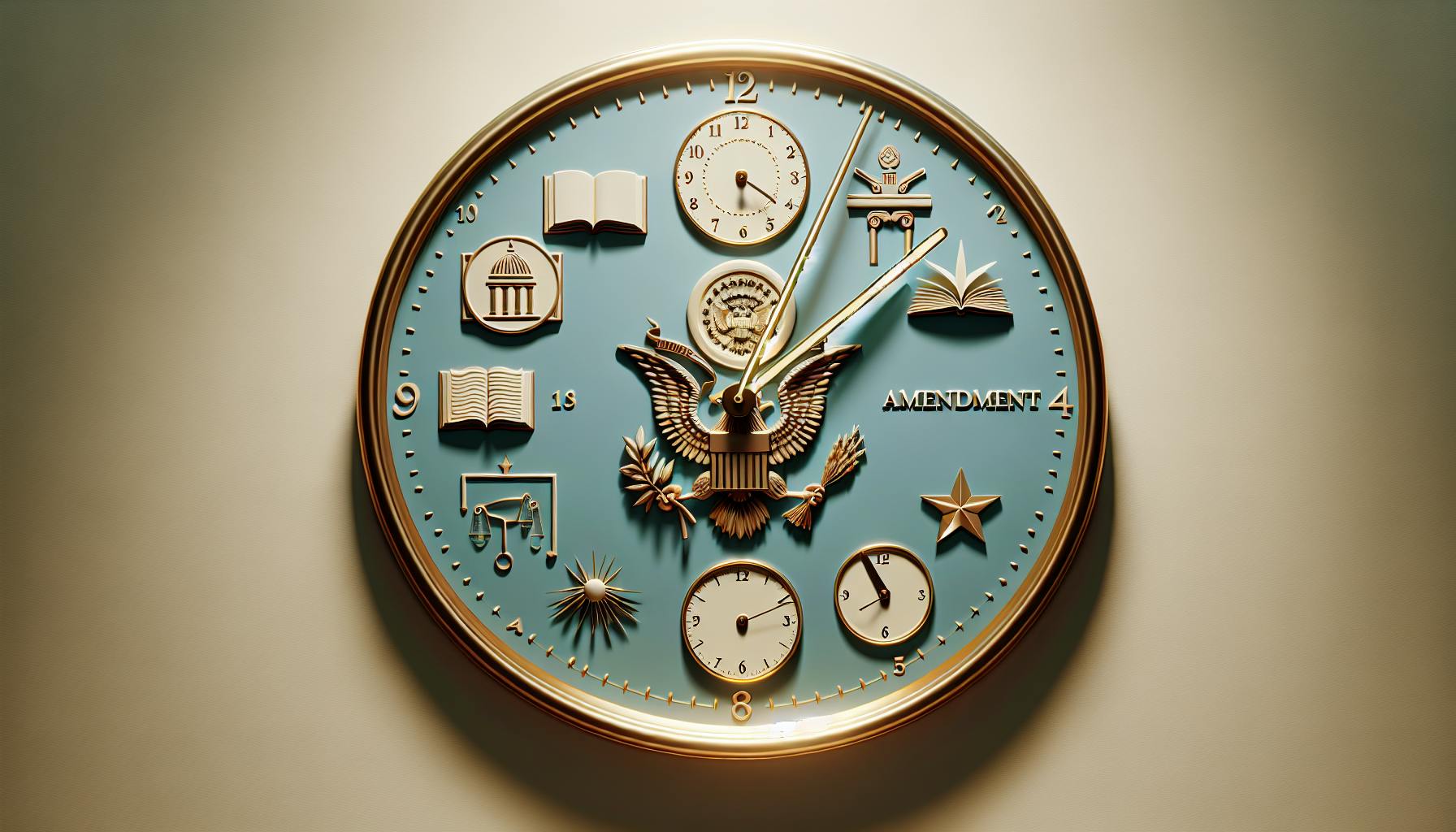Most civil cases can be complex, making it hard to ensure fair judgments.
The 7th Amendment provides citizens the right to a trial by jury in many civil cases, helping ensure justice is served.
This article will explore the 7th Amendment's origins, provisions, scope, landmark cases, real-world examples, debates, and legacy in preserving the role of juries in civil trials.
Introduction to the Seventh Amendment: Ensuring Jury Trials in Civil Cases
The Seventh Amendment to the US Constitution guarantees the right to a jury trial in certain civil court cases. This amendment reflects the historical importance of juries in the American legal system and provides an important civil liberty protection.
Exploring the Origins: Why Was the Seventh Amendment Created
The Seventh Amendment was influenced by the Anti-Federalists, who wanted additional protections for individuals in the Bill of Rights. Figures like James Madison believed jury trials were an important check on government overreach. The amendment helped appease Anti-Federalist concerns about the Constitution.
Seventh Amendment Simplified: Understanding Its Provisions
The Seventh Amendment states that for civil court cases dealing with disputes over $20, the right to a jury trial shall be preserved. This applies to common law cases from English common law carried over to the American legal system.
The Ratification Process and the Bill of Rights
As one of the ten amendments that make up the Bill of Rights, the Seventh Amendment was proposed by Congress in 1789 and ratified by the states in 1791. It was part of the effort to add protections for individuals from government overreach.
The Amendment's Modern-Day Relevance and Challenges
While civil jury trials remain an important right, some aspects of the Seventh Amendment have faced challenges. Issues like judge versus jury roles in trials have been debated, and the 20 dollar threshold is now far below inflation. However, the core idea of a civil jury trial remains relevant.
What is 7 the right to an jury trial in a civil case?
The Seventh Amendment to the U.S. Constitution guarantees the right to a jury trial in certain civil cases brought in federal court. Specifically, it states:
"In Suits at common law, where the value in controversy shall exceed twenty dollars, the right of trial by jury shall be preserved."
This means if a person sues someone else in federal court for more than $20, and it is a civil case under common law (as opposed to equity or maritime law), either side has the right to request a jury trial to resolve the dispute instead of leaving the decision solely to a judge.
Some key things to know about the 7th Amendment:
- It only applies to federal civil court cases - not criminal cases or civil cases filed in state courts. States have their own rules regarding civil jury trials.
- There must be a claim for monetary damages exceeding $20 for the right to a jury trial to apply.
- It preserves the right to a jury trial that existed under English common law at the time the Bill of Rights was adopted.
- The Supreme Court has held that certain issues in civil cases may be decided by a judge rather than a jury, such as the interpretation of patent claim terms.
So in essence, the 7th Amendment provides an important civil liberty - the right to have a jury of ordinary citizens hear the facts and decide monetary disputes rather than allowing judges to have sole authority over the outcome. This helps ensure fairness for all parties in the legal system.
Is trial by jury in the 6th or 7th Amendment?
The right to a jury trial is addressed in both the Sixth and Seventh Amendments to the U.S. Constitution.
The Sixth Amendment guarantees the right to a jury trial in criminal prosecutions. It states that "In all criminal prosecutions, the accused shall enjoy the right to a speedy and public trial, by an impartial jury." This applies to federal criminal cases.
The Seventh Amendment guarantees the right to a jury trial in civil cases exceeding $20. It states that "In Suits at common law, where the value in controversy shall exceed twenty dollars, the right of trial by jury shall be preserved." This applies to federal civil cases.
So in summary:
- The Sixth Amendment covers criminal prosecutions
- The Seventh Amendment covers civil cases over $20
The Seventh Amendment right to a jury trial only applies on the federal level. Individual state constitutions determine whether the right to a jury trial applies in state civil and criminal cases. Most state constitutions do provide for jury trials in both civil and criminal cases.
In both criminal and civil jury trials, the role of the jury is to weigh evidence, assess witness credibility, resolve factual disputes, and ultimately determine a verdict. However, criminal cases require a unanimous verdict while civil cases may have non-unanimous verdicts depending on the jurisdiction.
What is an example of a 7th Amendment trial?
One of the most well-known examples of the 7th Amendment in action is the landmark civil rights case Brown v. Board of Education. In this case, African American students challenged racial segregation in public schools as unconstitutional. Their case was heard in front of a jury as granted by the 7th Amendment, which states that the right to a jury trial shall be preserved in suits at common law.
The Brown case highlighted how impactful having a jury trial can be, especially for civil rights issues. After hearing arguments from both sides, the jury unanimously agreed that segregation in public schools was unconstitutional. This monumental verdict helped ignite the civil rights movement in America and led to the racial integration of public schools.
Other key 7th Amendment cases have involved issues like age discrimination, sexual harassment, and freedom of speech. The 7th grants individuals the right to have these civil cases heard and decided on by a jury of their peers. This continues to give citizens a powerful tool to fight for their rights in court.
Does the Constitution apply in civil cases?
The Seventh Amendment to the U.S. Constitution provides important protections in civil court cases. Specifically, it guarantees the right to a jury trial in most civil cases brought in federal court.
The Seventh Amendment states:
In Suits at common law, where the value in controversy shall exceed twenty dollars, the right of trial by jury shall be preserved, and no fact tried by a jury, shall be otherwise re-examined in any Court of the United States, than according to the rules of the common law.
This establishes that for civil cases in federal court dealing with more than $20, parties have a right to have a jury hear the case and reach a verdict, instead of relying solely on a judge's decision.
So while we often think of Constitutional rights like free speech and due process applying more in criminal cases, the Seventh Amendment makes clear that parties in civil cases also have important protections, like the right to have a jury decide factual questions instead of a judge alone. This aims to provide a check on potential government overreach in civil matters.
The Supreme Court has generally interpreted the Seventh Amendment right to a jury trial broadly to cover most common law cases for over $20 that deal with legal, as opposed to equitable, rights. However, there are some civil law areas, like admiralty and maritime law, where jury trials are not required constitutionally.
Overall, though, the Seventh Amendment provides a critical assurance that parties in many civil cases in federal court will have their factual disputes decided by regular citizens serving on a jury, rather than judges alone. This right serves as an important safeguard for civil liberties.
sbb-itb-585a0bc
sbb-itb-585a0bc
sbb-itb-585a0bc
Understanding the Scope of the Seventh Amendment
The Seventh Amendment guarantees the right to a jury trial in civil cases in the United States, but its scope is limited. The key distinction is between legal claims and equitable claims.
Trial by Jury in Civil Cases Amendment: Legal vs. Equitable Claims
The Seventh Amendment applies to "suits at common law." These are legal claims seeking monetary damages as a remedy. For example, a breach of contract claim seeking monetary compensation would warrant a jury trial under the Seventh Amendment.
In contrast, equitable claims seek remedies like injunctions or specific performance instead of money damages. For instance, a claim to stop patent infringement through an injunction would be an equitable claim that does not necessitate a jury trial.
Overall, the Seventh Amendment's guarantee of trial by jury depends on whether the civil claim is categorized as legal or equitable.
The Seventh Amendment and Diversity Jurisdiction
The Seventh Amendment also comes into play when a case involving state law claims is heard in federal court under diversity jurisdiction. Diversity jurisdiction allows federal courts to hear cases between citizens of different states.
In this situation, the Seventh Amendment requires the federal court to preserve the right to a jury trial if it existed under the state's law. So even though it is in federal court, state law dictates whether a jury trial is warranted.
Findings of Fact vs. Issues of Law
The Seventh Amendment allocates decision-making authority between the jury and the judge in a civil trial. Specifically, the jury serves as the finder of fact, while the judge determines issues of law.
The jury weighs the evidence and testimony to make findings of fact. For example, the jury decides if the defendant breached a contract or infringed a patent based on the facts.
Meanwhile, the judge makes determinations of law, such as whether to admit certain evidence or how to instruct the jury on the relevant legal standards. Drawing the line between issues of fact and law defines the jury's role under the Seventh Amendment.
Historical and Landmark 7th Amendment Court Cases
The Seventh Amendment has shaped civil litigation in the United States by enshrining the right to a jury trial in most civil cases. Over the years, landmark Supreme Court decisions have clarified and refined the application of the Seventh Amendment. These cases have had far-reaching impacts on civil procedure.
United States v. Wonson and the Reexamination Clause
In the 1812 case of United States v. Wonson, the Supreme Court established the reexamination clause of the Seventh Amendment. This clause states that no fact tried by a jury can be reexamined, other than according to the common law rules of evidence. Wonson upheld the sanctity of civil jury fact-finding, preventing judges from overturning jury verdicts. This precedent ensures that judges cannot simply disregard a civil jury's factual conclusions.
Galloway v. United States and the Directed Verdict
The 1943 Galloway v. United States case affected the use of directed verdicts in civil trials. Directed verdicts allow judges to decide cases as a matter of law, without sending them to a jury. The Galloway ruling made clear that judges should only rarely grant directed verdicts. Judges cannot direct verdicts simply because they disagree with the weight of the evidence. This precedent protects the role of civil juries as finders of fact.
Beacon Theatres v. Westover: Jury Trials and Equitable Claims
The 1959 Beacon Theatres v. Westover decision has shaped modern civil procedure when legal and equitable claims overlap. The Court ruled that when such overlaps occur, the legal claims with a Seventh Amendment jury right should be heard by a jury before the equitable claims. This upheld jury trial rights even when equitable issues are also present in civil cases.
Markman v. Westview Instruments, Inc.: Patent Cases and Jury Trials
In the 1996 Markman v. Westview Instruments case, the Supreme Court limited jury fact-finding on some issues in patent cases. The Court ruled that in patent cases, judges, not juries, must interpret the meaning of patent terms. However, juries still decide factual questions about patent infringement. While refined, Seventh Amendment rights remain crucial in patent trials.
In these and other cases, the courts have shaped how the Seventh Amendment applies to modern civil litigation. However, the core right to a jury trial in suits at common law remains a bedrock of the American judicial system.
The Seventh Amendment in Action: Real-World Examples
The Seventh Amendment has had a significant influence on civil litigation and jurisprudence in the United States. Here are some examples of how the right to a jury trial has played out in real-world cases across different areas of law.
7th Amendment Examples in Maritime Law
The Seventh Amendment applies to admiralty and maritime cases heard in federal court when the claim is considered "common law" rather than based strictly on maritime law. For example, in the case of Dice v. Akron, Canton & Youngstown Railroad Co., a jury trial was deemed appropriate for a railroad worker injured on a ship docked in navigable waters.
Copyright Infringement and the Role of Juries
In copyright disputes like Lehman v. Nakshian, juries may assess factual questions related to infringement, defenses, and monetary damages under the Seventh Amendment. Juries weigh evidence such as similarity between works or proof of access to determine if protected elements were copied.
Shareholder Lawsuits and the Right to a Jury Trial
The Seventh Amendment guarantees jury trials in many shareholder lawsuits heard in federal courts. In cases like Ross v. Bernhard, questions of stock valuation and corporate governance may be decided by juries along with equitable claims.
Consumer Lawsuits and the Impact of Inflation on the Twenty Dollars Clause
The Seventh Amendment's "Twenty Dollars Clause" requires claims over $20 to be heard by a jury. But with inflation, far more modest consumer cases may warrant juries. For example, in Curtis v. Loether, a housing discrimination dispute involved just $1,000 in damages but still triggered the Seventh Amendment right.
Contemporary Debates and the Future of the 7th Amendment
Evaluating the Need for Seventh Amendment Reforms
The Seventh Amendment has remained largely unchanged since its ratification over 200 years ago. Some legal experts argue reforms are needed to account for the complexity of modern civil litigation. Potential reforms include setting monetary thresholds on the types of cases subject to jury trials or allowing judges to overturn unreasonable jury verdicts.
However, proponents of preserving the Seventh Amendment in its current form argue that juries serve an important role in upholding civil liberties. They warn against eroding a long-standing Constitutional protection.
Jury Trials vs. Alternative Dispute Resolution Methods
There is an open debate around whether jury trials should remain the default option for federal civil cases. Alternative dispute resolution methods like arbitration and mediation promise efficiency, consistency, and privacy.
However, critics argue these alternatives undermine the Seventh Amendment's guarantee of a jury trial. They also warn that taking decision-making out of the hands of citizen juries threatens transparency and democratic principles.
There are reasonable arguments on both sides. The merits of each approach likely depend on the specifics of the case.
The Role of Technology in Seventh Amendment Proceedings
Technology is transforming legal processes, including the administration of jury trials. Judges now allow jurors to take notes on tablets. Video displays simplify the presentation of evidence. Remote jury selection through videoconferencing expands juror pools.
While technology promises efficiency gains, some worry it undermines the solemnity of courtroom proceedings or inhibits personal interactions. Guidelines may be needed to harness technology's benefits while preserving the integrity of jury trials.
On balance, technology seems poised to expand access to and streamline jury trials under the Seventh Amendment. However, its impact merits continual reassessment.
Conclusion: The Enduring Legacy of the Seventh Amendment
The Seventh Amendment has played a vital role in preserving the right to a jury trial in civil cases under the U.S. Constitution. Its enduring legacy continues to shape civil litigation in America today.
Reaffirming the Importance of Jury Trials in Civil Cases
The Seventh Amendment reaffirms the fundamental principle that citizens should have a voice in the judicial process. Through jury service, people can directly participate in the civil justice system. This promotes fairness, transparency, and public trust in legal outcomes.
The Seventh Amendment's Place in the Constitutional Framework
As part of the Bill of Rights, the Seventh Amendment is a core component of America's constitutional checks and balances. It limits governmental power while empowering ordinary citizens. The Seventh Amendment also interacts with other constitutional provisions related to the judicial system.
Looking Ahead: The Seventh Amendment in the 21st Century
Modern legal developments raise new questions about applying a 200+ year old amendment. However, the Seventh Amendment's core promise remains highly relevant. Upholding the right to jury trials in civil cases is key to ensuring justice and equality under the law.


